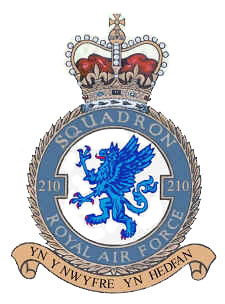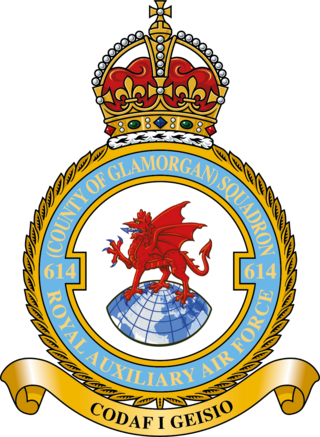
No. 138 Squadron RAF was a squadron of the Royal Air Force that served in a variety of roles during its career, last disbanded in 1962. It was the first 'V-bomber' squadron of the RAF, flying the Vickers Valiant between 1955 and 1962.
No. 515 Squadron RAF was a squadron of the Royal Air Force formed during the Second World War. It ushered in Electronic countermeasures (ECM) warfare, jamming enemy radar installations from October 1942 as the only such squadron in the RAF initially. Later in the war 515 Sqn was joined by other squadrons as part of No. 100 Group RAF. The squadron disbanded after VE day, when the need for such a specialised squadron had reduced.

667 Squadron AAC is a former squadron of the British Army's Army Air Corps (AAC).
No. 587 Squadron RAF was an anti-aircraft co-operation squadron of the Royal Air Force from 1943 to 1946.
No. 357 Squadron was a special operations squadron of the Royal Air Force. During the Second World War it was involved in supplying Allied ground forces operating behind enemy lines, in the South-East Asian theatre.

No. 210 Squadron was a Royal Air Force unit established in the First World War. Disbanded and reformed a number of times in the ensuing years, it operated as a fighter squadron during the First World War and as a maritime patrol squadron during the Spanish Civil War, the Second World War and the Cold War before it was last deactivated in 1971.
No. 228 Squadron RAF was a squadron of the Royal Air Force active at various times between 1918 and 1964. It spent the greatest part of its existence flying over water, doing so in the First, and Second World Wars and beyond, performing anti-submarine, reconnaissance and air-sea rescue tasks.
No. 512 Squadron was a Second World War Royal Air Force transport squadron.
No. 516 Squadron RAF was an army co-operation squadron of the Royal Air Force during the Second World War.
No. 520 Squadron RAF was a meteorological squadron of the Royal Air Force during the Second World War.
No. 521 Squadron of the Royal Air Force was a Second World War meteorological observation unit operating from Norfolk.

No. 237 Squadron was a Royal Air Force aircraft squadron. During the Second World War the unit was formed from No. 1 Squadron Southern Rhodesian Air Force for operations in North Africa.
No. 293 Squadron was a Royal Air Force air-sea rescue squadron. During the Second World War the unit operated search and rescue missions for Allied aircraft operating over Italy.
No. 285 Squadron RAF was a non-operational Second World War Royal Air Force squadron that operated a variety of aircraft to provide targets for anti-aircraft gun practice initially in the North Midlands and North Wales area.
No. 524 Squadron was a Royal Air Force Coastal Command aircraft squadron that operated during the Second World War.

No. 614 Squadron was originally formed on 1 June 1937 as an army co-operation squadron unit of the Auxiliary Air Force. It served during the Second World War first in this role and later as a bomber squadron. Upon reformation it served as a fighter squadron until the disbandment of the Royal Auxiliary Air Force on 10 March 1957.
No. 528 Squadron RAF was a radar calibration unit of the Royal Air Force during the Second World War, active from June 1943 until September 1944.
No. 240 Squadron RAF was a Royal Air Force flying boat and seaplane squadron during World War I, World War II and up to 1959. It was then reformed as a strategic missile squadron, serving thus till 1963.

No. 662 Squadron AAC is a squadron of the British Army's Army Air Corps (AAC) which flies the Boeing AH-64E Apache from Wattisham Flying Station as part of 3 Regiment Army Air Corps. It was formerly No. 662 Squadron, a Royal Air Force air observation post squadron associated with the 21st Army Group during the Second World War and later part of the Royal Auxiliary Air Force. Numbers 651 to 663 Squadrons of the RAF were air observation post units working closely with British Army units in artillery spotting and liaison. A further three of these squadrons, 664–666, were manned with Canadian personnel. Their duties and squadron numbers were transferred to the Army with the formation of the Army Air Corps on 1 September 1957.
No. 661 Squadron AAC is a squadron of the British Army's Army Air Corps (AAC). It was formerly No. 661 Squadron, a Royal Air Force air observation post squadron associated with the Canadian 1st Army and later part of the Royal Auxiliary Air Force. Numbers 651 to 663 Squadrons of the RAF were air observation post units working closely with British Army units in artillery spotting and liaison. A further three of these squadrons, 664–666, were manned with Canadian personnel. Their duties and squadron numbers were transferred to the Army with the formation of the Army Air Corps on 1 September 1957.





